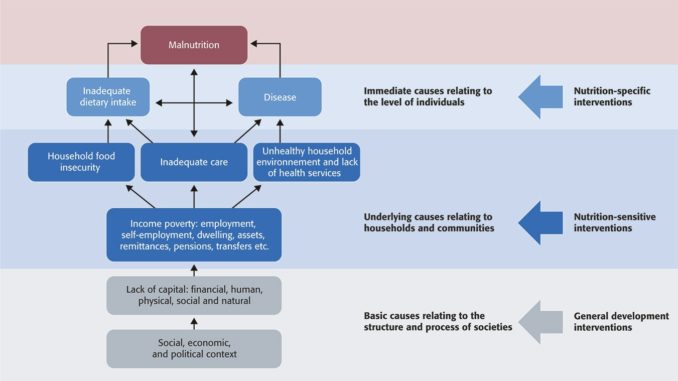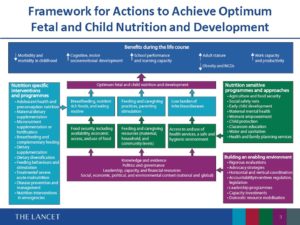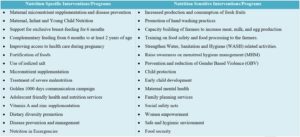
Table of Contents
Introduction:
- Nutrition is the science of food that is absorbed by our body and as a result it helps in the proper functioning of the human body.
- Nutrition is the building blocks of our body and play specific roles in maintaining our health.
- In scientific terms, Nutrition refers to the intake, absorption, and utilization of food in relation to our body’s dietary needs.
- Nutrition has always been a key indicator of development. Thus it always has been the priority for development
- Improved nutrition can lead the progress in health, education, employment, empowerment of women and reduction of poverty and inequality.
- However, despite the growing body of evidence on importance of investing in good nutrition to avoid malnutrition and its long-lasting negative effects on human development, governments and key stakeholders still fall short on action.
- Therefore, to tackle malnutrition, a broad array of interventions ranging from agriculture to education to specific health and nutrition interventions are implemented.
- Hence the nutrition interventions are broadly classified into two categories:
- Nutrition-specific interventions
- Nutrition-sensitive interventions
Benefits of Nutritional Interventions:
- Decreases mortality and morbidity
- Increases cognitive, motor, and socio-emotional development
- Increases school performance and learning capacity
- Increases adult stature
- Decreases obesity and non-communicable disease cases
- Improves early childhood development (Bhutta et al., 2013), reducing infectious disease burden (Fogel, 1993; Null et al., 2018) and improving treatment adherence (Kenworthy, 2017).
What is Nutrition Specific Intervention?
- Nutrition-specific interventions are the interventions which address the immediate cause of malnutrition.
- Nutrition specific interventions focuses on those interventions that target the direct determinants of nutrition.
- Nutrition specific interventions are largely delivered by the health sector.
- Some of the examples of nutrition-specific interventions are:
- Maternal micronutrient supplementation and disease prevention
- Support for exclusive breast-feeding and complementary feeding
- Micronutrient supplementation etc.

What is Nutrition Sensitive Intervention?
- Nutrition-sensitive interventions are those interventions whose primary objective is not nutrition, but that which have potential to improve food and nutrition security of beneficiaries.
- Nutrition sensitive interventions are those interventions that influence the underlying determinants of nutrition.
- Nutrition sensitive interventions are largely delivered by the education, agriculture, livestock, water and sanitation, women and children and other sectors.
- Nutrition-sensitive intervention includes integration of following approaches:
- Agriculture: Making nutritious food more accessible and available to everyone, and supporting small farms as a source of income
- Clean Water and Sanitation: Improving access to reduce infection and disease
- Education and Employment: Making sure children learn and earn sufficient income as adults through maintain their energy
- Healthcare: Improving access to services to ensures that people are healthy and improve health care seeing behavior
- Support for Resilience: During emergencies and conflicts there is a need for stronger, healthier population and sustained prosperity
- Women’s Empowerment: Women are empowered to be leaders in Nutrition-Sensitive Approaches
- Some of the examples of nutrition sensitive interventions:
- Increased production and consumption of fresh fruits
- Promotion of hand washing practices etc.
Examples of Nutrition Specific and Nutrition Sensitive Interventions:

14 Differences between Nutrition Specific and Nutrition Sensitive Interventions:
| Nutrition-Specific Interventions | Nutrition-Sensitive Interventions |
| Nutrition specific interventions are those which address immediate causes of nutrition. | Nutrition sensitive interventions are those that address underlying causes of undernutrition. |
| It refers to interventions that address the immediate determinants of fetal and child nutrition and development | It influences the underlying determinants of fetal and child nutrition and development |
| The objective of nutrition specific intervention is to address malnutrition. | The objective of nutrition sensitive intervention is not to address malnutrition but those which are interlinked with nutrition. |
| Nutrition specific intervention will contribute more to the reduction of malnutrition as compared to nutrition sensitive intervention. | Nutrition sensitive intervention will relatively contribute less to the reduction of malnutrition as compared to nutrition specific interventions. |
| Increased nutrition specific interventions lead to sharper decline in the proportion of stunted children. | Nutrition sensitive interventions play a supportive role in the decline of stunting in children. |
| Nutrition specific interventions improve the nutrition status directly. | Nutrition sensitive interventions does not necessarily target nutrition but helps to improve nutrition status indirectly. |
| It can solve the immediate problem regarding the malnutrition. | It solves the root cause and thus can have greater impact on reducing malnutrition and creating resilience for future. |
| Nutrition specific interventions doesn’t have wider scale, coverage, and effectiveness | Nutrition sensitive interventions can serve as delivery platforms for nutrition-specific interventions, potentially increasing their scale, coverage, and effectiveness. |
| Studies have shown a statistically significant association between nutrition specific interventions and reduction in stunting. | No such statistically significant associations can be found between nutrition sensitive interventions and stunting. |
| All nutrition specific interventions implemented alone or jointly, lead to improved health outcome. | All nutrition specific interventions implemented alone does not necessarily lead to improved health outcome.
E.g.: improved water and sanitation alone do not improve the health outcome |
| It is applicable only in local setting with specific nutrition programs. | It has wide application with context sensitive application |
| It is easy to understand the relationship between nutrition specific intervention and nutrition status. | It is relatively difficult for a person to understand the relationship between nutrition sensitive intervention and nutrition status. |
| It can create dramatic impact on reducing malnutrition but cannot meet up with reducing standard targets. | It can meet up with reducing the targets along with nutrition specific intervention |
Examples of nutrition specific interventions:
|
Examples of nutrition sensitive interventions:
|
References and For More Information:
https://ebrary.ifpri.org/utils/getfile/collection/p15738coll5/id/3993/filename/3994.pdf
https://academic.oup.com/heapol/article/34/Supplement_2/ii18/5625030
https://www.karger.com/Article/Pdf/452392
https://bmcnutr.biomedcentral.com/articles/10.1186/s40795-021-00443-1
https://www.ennonline.net/fex/55/nutsensitiveprogrammingwfp
https://www.ifpri.org/publication/nutrition-sensitive-interventions-and-programmes-0
https://journals.plos.org/plosone/article?id=10.1371/journal.pone.0214358
https://scalingupnutrition.org/progress-impact/evidence-informing-action/nutrition-in-the-lancet/